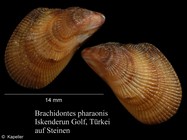Traits taxon details
Brachidontes pharaonis (P. Fischer, 1870)
140437 (urn:lsid:marinespecies.org:taxname:140437)
accepted
Species
marine
(of ) Fischer, P. (1870). Sur la faune conchyliologique marine des baies de Suez et de l'Akabah. <em>Journal de Conchyliologie.</em> 18: 161-179., available online at http://biodiversitylibrary.org/page/15160580
page(s): 169 [details]
page(s): 169 [details]
MolluscaBase eds. (2025). MolluscaBase. Brachidontes pharaonis (P. Fischer, 1870). Accessed through: Marine Species Traits editorial board (2025) Marine Species Traits at: https://marinespecies.org/traits/aphia.php?p=taxdetails&id=140437 on 2025-05-17
Marine Species Traits editorial board (2025). Marine Species Traits. Brachidontes pharaonis (P. Fischer, 1870). Accessed at: https://marinespecies.org/traits/aphia.php?p=taxdetails&id=140437 on 2025-05-17
Date
action
by
original description
(of ) Fischer, P. (1870). Sur la faune conchyliologique marine des baies de Suez et de l'Akabah. <em>Journal de Conchyliologie.</em> 18: 161-179., available online at http://biodiversitylibrary.org/page/15160580
page(s): 169 [details]
context source (Introduced species) Katsanevakis, S.; Bogucarskis, K.; Gatto, F.; Vandekerkhove, J.; Deriu, I.; Cardoso A.S. (2012). Building the European Alien Species Information Network (EASIN): a novel approach for the exploration of distributed alien species data. <em>BioInvasions Records.</em> 1: 235-245., available online at http://easin.jrc.ec.europa.eu [details] Available for editors
context source (HKRMS) Fong, C. W. (1998). Some aspects of the ecology of the seagrass Zostera japonica in Hong Kong. <em>MPhil thesis. The University of Hong Kong.</em> [details]
basis of record Gofas, S.; Le Renard, J.; Bouchet, P. (2001). Mollusca. in: Costello, M.J. et al. (eds), European Register of Marine Species: a check-list of the marine species in Europe and a bibliography of guides to their identification. <em>Patrimoines Naturels.</em> 50: 180-213., available online at http://www.vliz.be/imisdocs/publications/ocrd/254404.pdf [details]
additional source Sirna Terranova M., Lo Brutto S., Arculeo M. & Mitton J.B. 2007. A mitochondrial phylogeography of <i>Brachidontes variabilis</i> (Bivalvia: Mytilidae) reveals three cryptic species. <i>Journal of Zoological Systematics and Evolutionary Research</i>, 45(4): 289–298. [details]
additional source Tan, S. H. M.; Wells, F. E.; Lukehurst, S. S.; Strong, E. E.; Sanpanich, K.; Duangdee, T.; Ambarwati, R.; Tan, K. S. (2024). Unravelling the <i>Brachidontes variabilis</i> species complex (Bivalvia: Mytilidae) of the Indo-Pacific region. <em>Journal of Molluscan Studies.</em> 90(4): Published online 5 November., available online at https://doi.org/10.1093/mollus/eyae037 [details]
page(s): 169 [details]
context source (Introduced species) Katsanevakis, S.; Bogucarskis, K.; Gatto, F.; Vandekerkhove, J.; Deriu, I.; Cardoso A.S. (2012). Building the European Alien Species Information Network (EASIN): a novel approach for the exploration of distributed alien species data. <em>BioInvasions Records.</em> 1: 235-245., available online at http://easin.jrc.ec.europa.eu [details] Available for editors
context source (HKRMS) Fong, C. W. (1998). Some aspects of the ecology of the seagrass Zostera japonica in Hong Kong. <em>MPhil thesis. The University of Hong Kong.</em> [details]
basis of record Gofas, S.; Le Renard, J.; Bouchet, P. (2001). Mollusca. in: Costello, M.J. et al. (eds), European Register of Marine Species: a check-list of the marine species in Europe and a bibliography of guides to their identification. <em>Patrimoines Naturels.</em> 50: 180-213., available online at http://www.vliz.be/imisdocs/publications/ocrd/254404.pdf [details]
additional source Sirna Terranova M., Lo Brutto S., Arculeo M. & Mitton J.B. 2007. A mitochondrial phylogeography of <i>Brachidontes variabilis</i> (Bivalvia: Mytilidae) reveals three cryptic species. <i>Journal of Zoological Systematics and Evolutionary Research</i>, 45(4): 289–298. [details]
additional source Tan, S. H. M.; Wells, F. E.; Lukehurst, S. S.; Strong, E. E.; Sanpanich, K.; Duangdee, T.; Ambarwati, R.; Tan, K. S. (2024). Unravelling the <i>Brachidontes variabilis</i> species complex (Bivalvia: Mytilidae) of the Indo-Pacific region. <em>Journal of Molluscan Studies.</em> 90(4): Published online 5 November., available online at https://doi.org/10.1093/mollus/eyae037 [details]
 Present
Present  Inaccurate
Inaccurate  Introduced: alien
Introduced: alien  Containing type locality
Containing type locality
To Barcode of Life (175 barcodes)
To Biodiversity Heritage Library (3 publications)
To Conchology (Brachidontes pharaonis)
To Conchology (Brachidontes pharaonis)
To European Nucleotide Archive, ENA (Brachidontes pharaonis)
To GenBank (305 nucleotides; 305 proteins)
To Malacopics (Brachidontes pharaonis (P. Fischer, 187) Cyprus, Famagusta, Ayia Napa, beached, col...
To Malacopics (Brachidontes pharaonis (P. Fischer, 187) Egypt, Al Bahr al Ahmar, Ras Gemsa, at low...
To Malacopics (Brachidontes pharaonis (P. Fischer, 187) Seychelles, Anse Boileau, low tide, attach...
To PESI
To Biodiversity Heritage Library (3 publications)
To Conchology (Brachidontes pharaonis)
To Conchology (Brachidontes pharaonis)
To European Nucleotide Archive, ENA (Brachidontes pharaonis)
To GenBank (305 nucleotides; 305 proteins)
To Malacopics (Brachidontes pharaonis (P. Fischer, 187) Cyprus, Famagusta, Ayia Napa, beached, col...
To Malacopics (Brachidontes pharaonis (P. Fischer, 187) Egypt, Al Bahr al Ahmar, Ras Gemsa, at low...
To Malacopics (Brachidontes pharaonis (P. Fischer, 187) Seychelles, Anse Boileau, low tide, attach...
To PESI







.jpg)
.jpg)